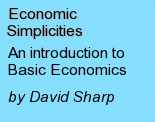

|
|
INTRODUCTION TO ECONOMICS
Lesson 7
WEALTH
Wealth is a concept that has played and continues
to play a significant role in the thinking of economists. It was [and even today by some is still] considered to be the
very subject matter of the discipline itself.
Thus the title of what is widely considered to be the first
comprehensive economics text is Adam Smith’s 1776 work,” An Inquiry
into the Nature and Causes of the Wealth of Nations”.
The word “wealth” is widely and commonly
used; thus “About 11% of the population owns nearly 40% of the wealth
whilst more than 15% own less than 5% of the wealth”, “Australia is
a wealthy country [or society]”, “ Tom[ Dick or Harry] is a wealthy
person” or “There ought to be a wealth tax.
Examination of the above examples suggests that
“wealth” is used in at least 2 senses; public and private or
individual and collective. It
is likely that there are differences in meaning between the two.
It is suggested that one distinction is that in a private or
individual sense it means all property having a monetary value whilst in
a public or collective sense it means everything, especially material
things, that has economic utility.
The latter could include such things as favourable culture, good
laws and a pleasant climate. When
looked at historically it is likely that the accepted meaning in each
sense has evolved over time and today means something different from
what it meant a century or even a generation ago.
Wealthy is comparative; a person considered
wealthy in Nar Nar Goon would not necessarily be considered so in
Melbourne. It denotes a
measurement, the quality of having more.
As with value, a concept to which it is related, an objective
measurement of wealth would require a common unit of measure.
Economists have sought [and
continue to seek ] such unit of measure.
Money has been used. But
money itself is not a fixed unit of measurement such as metres or kilos.
Similar problems beset the alternative of hours of labour.
Without a common unit of measurement how properly
is it possible objectively to determine the overall wealth of a person
society or country without in effect adding apples to oranges? Many economists reason accordingly that wealth is subjective
rather than objective and that wealth ultimately is in the eye of the
beholder. Some even query
whether as a science economics should talk in terms of wealth at all.
Apart from seeking to determine the meaning of
wealth, economics as a discipline has been much concerned with the
creation of wealth and with questions relating to its distribution. Is wealth creation a zero-sum game; ie is the amount of
wealth static so that a person society or country can only acquire
wealth by taking it away from or denying it to another.
Or can it build wealth or cause it to grow?
If the latter then how? Most
economists probably subscribe to the view that in the immediate short
term at least wealth is fixed but that in the medium to long term it can
grow, arguably effectively without limit.
If wealth is material possessions then there is
an implicit requirement for a system of property rights and enforcement.
Is it possible to be wealthy without property ie without being
the owner of scarce resources? This
would suggest that those who dwell in a natural paradise with access to
unlimited resources would not properly be described as wealthy.
Consideration of the above gives rise to a number
of questions for consideration including;
[a] What is wealth?
Is it limited?
[b] Is wealth confined to material objects?
[c] Are public goods and services wealth?
[d] Is wealth property?
[e] Are such things as a favourable culture, good
laws and a desirable climate to be taken into account when considering wealth?
[f] Can a society or a country be wealthy or only
individuals?
[g] Is prestige wealth?
[h] Is wealth power?
David Sharp
April 2005
Return to the Home Page
|
|




